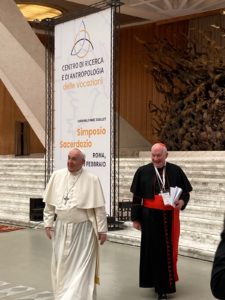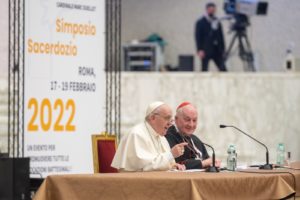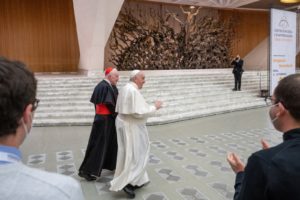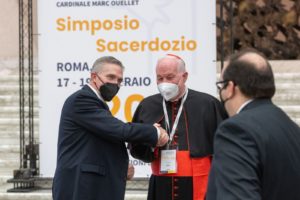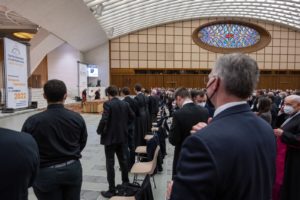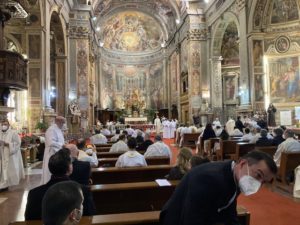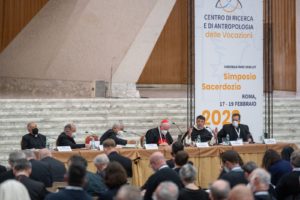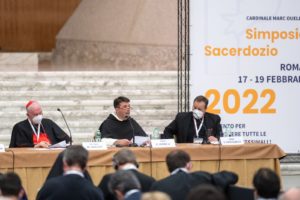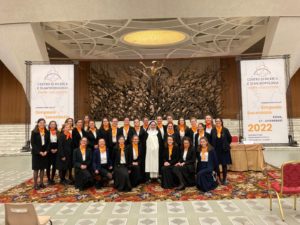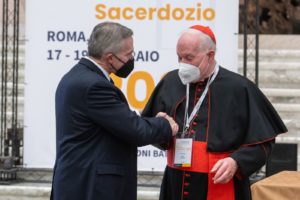Discover the program
WORKS
– RELIVE THE SYMPOSIUM
You can watch the whole Symposium in the original languages of the speakers or in the English translations
Cardinal Ouellet's conference
Carissimo Santo Padre
Eminence, Eccellenze,
Dear Symposium participants,
“Ask the Lord of the harvest to send out workers into his harvest!” The Lord calls workers of all kinds to work in his vineyard. Some are hired first thing in the day, some in the middle of the day, still others at the last hour; all receive a just salary, not in hard cash according to the criteria of this world, but in communion with the Master whose goodness cannot be overcome in generosity.
What can we expect from a “fundamental theology of the priesthood” in the current context charged with the drama of sexual abuse perpetrated by clerics? Shouldn’t we rather abstain from speaking of the priesthood when the faults and crimes of unworthy ministers make the headlines of the international press, for having betrayed their commitment or for having shamefully covered up the culprits of such depravities? Wouldn’t he rather shut up, repent and look for the causes of these disastrous slippages?
We are torn and humbled by these crucial questions that live with us every day as members of the Church of Jesus Christ. This is an opportune time to express our sincere regrets and to ask for forgiveness from victims of all kinds who suffer that their lives have been shattered by abusive and criminal behavior that has remained too long hidden and treated superficially by protecting the institution and the culprits instead of the victims. This symposium acknowledges the popular outcry and anger that afflicts us; we join our voices to seekers of truth and justice while adding prayer to the Lord of the harvest for the grace to respond adequately to the challenges posed by the priestly crisis of our time.
In this respect, I believe that it will eventually be necessary to organize an event like this to take stock of the sociological studies in progress and analyze the historical, cultural, and even theological causes that can uncover the root of what Pope Francis calls “clericalism.” Clericalism is a generic but nevertheless concrete term designating a set of phenomena of abuse of power, spiritual abuse, abuse of conscience, of which sexual abuse is only the tip of the iceberg, visible and perverse, which emerges from deeper deviations to be identified and unmasked.
Dear friends, we are not yet equipped for this painful and yet necessary exercise, this examination of theological, spiritual and pastoral conscience. We must prepare for it through stages of reflection that first reconstruct the global horizon of the priesthood and the complementary dimensions of its mediation; because at the base of these phenomena there is an imbalance, an overvaluation of one form of the priesthood at the expense of the other form, baptismal, alas almost forgotten in the Catholic world. The magisterial defense of the ministerial priesthood in the face of the Protestant Reformation left the other essential dimension in the shadows, somehow endorsing a clerical mentality of power and an attitude of excessive control by clerics over the whole of the ecclesial community. Current synodal research awakens hope for a new balance.
The objective of this symposium is to deepen this global horizon of the priesthood of Christ given in sharing first to the baptized, then to the ordained ministers, so that the concrete relationships between the different members of the people of God are actively part of the framework of an ecclesiology of communion, with a fundamental and multifaceted commitment to a synodal Church. The Holy Spirit calls the Church in the third millennium to be synodal and thus to universalize her mission by announcing the Good News as a People journeying through history, as an articulated Body which counts on each of its members to offer the Gospel to all mankind.
Finding the global horizon of the priesthood in its two forms of participation, baptismal and ministerial, in the one priesthood of Christ is the condition prior to a full theological analysis of the drama of abuse; it also makes it possible to take up the question of the place of women in the Church in a more open way and more sensitive to the charismatic dimension of the communities; it should further encourage and support enthusiasm for all vocations with an attractive vision of their communion. Why should it not be permitted in a world saturated with bad news to make way for the joy of a new vocational enthusiasm in following Christ?
We are extremely honored and encouraged, Most Holy Father, by your presence at the opening of this event which you have supported from the beginning. Thanking you with all my heart, I also thank and warmly welcome all those who have registered despite the uncertainties of the pandemic. I again greet all those who will follow these meetings in virtual mode. Most Holy Father, we are eager to hear from you and to allow ourselves to be spurred on in the direction of your discernment of the Holy Spirit at work today for a missionary conversion of the Church. With you, we pray to the Lord of the harvest to send workers into his harvest.
Pope Francis speech
I am grateful for the opportunity given to me to share with you this reflection which stems from what the Lord has made me realize gradually during these 50 years of priesthood and more. I do not want to exclude from this grateful memory those priests who, by their lives and their witness, have shown me since my childhood what gives shape to the face of the Good Shepherd. I pondered what I could share about the life of the priest today. I have come to the conclusion that the best word comes from the testimony I have received from many priests over the years. What I propose to you is the fruit of my reflection on them, recognizing and contemplating the characteristics that distinguished them and gave them particular strength, joy and hope in their pastoral mission.
At the same time, I must say the same of those brother priests whom I had to accompany because they had lost the fire of first love and their ministry had become sterile, repetitive and almost meaningless. The priest goes through different conditions and different phases in his life. I myself have passed through various conditions and phases, and, in “ruminating” the promptings of the Spirit, I have found that in certain situations, including times of trial, difficulty and desolation, when I lived and shared the experience, in a way, peace remained. I am aware that there would be a lot to say and theorize about the priesthood. Today I want to share with you this “little synthesis” so that the priest of today, whatever the moment he is living, can know the peace and fruitfulness that the Spirit wants. give him. I do not know if these reflections are the “swan song” of my priestly life, but I can assure you that they come from my experience. No theory here, I’m talking about what I experienced.
The era in which we live asks us not only to take note of change, but also to welcome it with the awareness that we are facing a change of era – I have already repeated this several times. If we doubted it, the Covid has made it more than obvious: its outbreak is much more than a health issue, much more than just a cold.
Change always presents us with many ways to deal with it. The problem is that many actions and attitudes can be useful and good, but not all of them have a flavor of the Gospel. And that is where the crux lies, discerning what change and action does and does not have the flavor of the gospel. For example, the search for codified forms, very often anchored in the past, which “guarantee” us a kind of protection against risks by taking refuge in a world and in a society which no longer exist (if they ever existed) , as if this determined order were capable of putting an end to the conflicts that history presents to us. It is the decline of turning back to take refuge.
Another attitude may be one of over-optimism – “everything will GOOD” -; going too far indiscriminately and without making the necessary decisions. This optimism, ends up ignoring the victims of this transformation and fails to accept the tensions, complexities and ambiguities of the present time, and which “consecrates” the latest novelty as what is truly real, thus disregarding the wisdom of the years. . (There are two types of flight; the attitudes of the mercenary who sees the wolf arrive and who flees: he flees towards the past or he flees towards the future). None of these attitudes leads to mature solutions. The concreteness of today, we have to stop there, at the concreteness of today.
I rather like the attitude that comes from taking care confident of reality, anchored in the wise, living and life-giving Tradition of the Church which enables us to set sail without fear. I have the feeling that Jesus, at this moment in history, invites us once again to “go out to sea” (cf. Lk 5, 4) with the confidence that He is the Lord of history and that, guided by Him, we will be able to discern the horizon to be covered. Our salvation is not an ascetic salvation, a laboratory salvation, no, or disembodied spiritualisms – there is always the temptation of Gnosticism, which is modern and topical –; Discerning the will of God means learning to interpret reality with the eyes of the Lord, without having to dodge what is happening to our people where they live, without the anxiety that leads to seeking a rapid and reassuring outcome, guided by the ideology of the moment or by a prefabricated response, both incapable of apprehending the most difficult and even obscure moments of our history. These two paths lead us to deny “our Church history, which is glorious as a history of sacrifice, of hope, of daily struggle, of life spent in service, of constancy in hard work” ( Exhortation ap. Evangelii gaudium, n. 96).
In this context, priestly life is also affected by this challenge. The vocations crisis that afflicts our communities in various places is a symptom of this. But it is also true that it is often due to the absence in the communities of an infectious apostolic fervor which, consequently, does not inspire enthusiasm and is not attractive. Functional communities, for example, are well organized but lack enthusiasm, everything is in place but the fire of the Spirit is lacking. Authentic vocations are born where there is life, fervor and a desire to bring Christ to others. Even in parishes where the priests are not very committed or joyful, it is the fraternal and fervent life of the community that arouses the desire to devote oneself entirely to God and to evangelization, especially if this lively community prays with insistence. for vocations and has the courage to propose a specific path of consecration to its young people. When we fall into functionalism, into pastoral organization – for everything and only in that – it does not attract at all, but when there is a priest or a community which has this Christian, baptismal fervor, there is attraction of new vocations.
The life of a priest is above all the story of the salvation of a baptized person. Cardinal Ouellet made this distinction between the ministerial priesthood and the baptismal priesthood. We sometimes forget Baptism, and the priesthood becomes a function: functionalism, and that is dangerous. We must never forget that any specific vocation, including that of the Order, is the fulfillment of Baptism. The temptation is always great to live a priesthood without Baptism, – and there are no priests “without baptism” – that is, without remembering that the first call is that to holiness. To be holy is to conform to Jesus and allow his sentiments to prevail in our lives (cf. Phil 2, 15). It is only when we seek to love as Jesus loved that we too make God visible and realize our call to holiness. Saint John Paul II rightly reminded us that “the priest, like the Church, must become more and more aware of the permanent need he has to be evangelized” (Exhort. ap. post-syn. < a href=”https://www.vatican.va/content/john-paul-ii/en/apost_exhortations/documents/hf_jp-ii_exh_25031992_pastores-dabo-vobis.html”> Pastores Dabo Vobis, March 25, 1992, n. 26). And when you go and tell certain bishops, certain priests that they need to be evangelized… they don’t understand. And what is happening is the drama of today.
Any specific vocation must be submitted to this type of discernment. Our vocation is above all a response to the One who first loved us (cf. 1 Jn 4, 19). And this is the source of hope because, even in the midst of crisis, the Lord does not cease to love and therefore to call. And each of us is the witness: one day, the Lord found us, where we were and as we were, in contradictory environments or in complex family situations. I like to reread Ezekiel in chapter 16 and sometimes I identify with him: he found me here, he found me like this, and he got me going… But that didn’t stop him from wanting write, through each of us, the history of salvation. It has been that way from the start – think of Peter and Paul, Matthew…, to name a few. Having chosen them is not an ideal option but a concrete commitment to each one. Each one, looking at his own humanity, his own history, his own character, must not ask himself if a choice of vocation is appropriate or not, but if, in conscience, this vocation reveals in him this potential of Love that he has received on the day of Baptism.
In these times of change, many questions must be faced; as well as the temptations to come. This is why I would simply like to dwell in this intervention on what seems to me to be decisive for the life of a priest today, keeping in mind what Paul says: “In Him [that is- i.e. in Christ] the whole building rises harmoniously to become a holy temple in the Lord. (Ep 2, 21). Well-ordered growth means growth in harmony, and growth in harmony can only be done by the Holy Spirit, as Saint Basil so aptly defines it: “Ipse harmonia est”, at number 38 of the Treatise [“On the Holy Spirit “]. I thought that any building, to stand up, needs solid foundations. I therefore want to share the attitudes that give solidity to the person of the priest; I want to share – you’ve heard it before, but I’m going to repeat it one more time – the four building blocks of our priestly life, which we will call the “four proximities” because they follow God’s style, which is basically a closeness style (cf. Dt 4, 7). He defines himself to the people as follows: “Tell me, what people have their gods so close as you to me? “. God’s style is closeness, a special, compassionate and tender closeness. The three words that define the life of a priest, and of a Christian too, because they are drawn precisely from the style of God: closeness, compassion and tenderness.
I’ve referenced this before, but I’d like to I will dwell on it at greater length today because the priest, rather than recipes or theories, needs concrete tools to approach his ministry, his mission and his daily life. Saint Paul exhorted Timothy to keep alive the gift of God which he had received through the laying on of hands, which is not a spirit of fear, but of strength, love and sobriety (cf. 2 Tm 1, 6-7). I believe that these four pillars, these four “proximities” that I am now going to talk about can help in a practical, concrete and hopeful way to revive the gift and fruitfulness that were once promised to us, to keep this gift alive.
Above all, closeness to God. Four proximities, and the first is proximity to God.
This is proximity to the Lord of Proximities. “I am the vine, and you are the branches – This is where John in the Gospel speaks of ‘abiding’. He who abides in me and in whom I abide bears much fruit, for apart from me you can do nothing. If anyone does not remain in me, he is cast out like a twig and withers. The dry branches, we pick them up, we throw them into the fire, and they burn. If you abide in me, and my words abide in you, ask whatever you want, and it will come true for you” (Jn 15, 5-7).</ span>
The priest is invited above all to cultivate this closeness, this intimacy with God . He will be able to draw from this relationship all the strength necessary for his ministry. The relationship with God is, so to speak, the graft that keeps us in a bond of fruitfulness. Without a serious relationship with the Lord, our ministry becomes sterile. Closeness to Jesus, contact with his Word, allows us to place our life before his, to learn not to be scandalized by everything that happens to us, to defend ourselves from “scandals”. As was the case with the Master, you will pass through moments of joy and nuptials, miracles and healings, multiplication of loaves and rest. There will be times when you can be praised, but there will also be times of ingratitude, rejection, doubt and loneliness, to the point of saying, “My God, my God, why have you forsaken me ? (Mt 27.46).
Closeness to Jesus invites us not to fear any of these moments, no not because we are strong, but because we look to Him, we cling to Him and we say to Him, “Lord, do not let me fall into temptation!” Make me understand that I am living an important moment in my life and that you are with me to test my faith and my love” (C.M. Martini, Encounter with the Risen Lord, San Paolo, p. 102). This closeness to God sometimes takes the form of a struggle: to struggle with the Lord especially in the moments when his absence is most felt, in the life of the priest or in that of the people entrusted to him. To fight all night and ask for his blessing (cf. Gn 32, 25-27) which will be a source of life for many. Sometimes it’s a struggle. A priest who works here in the Curia – who has a difficult job, putting order, a young person – told me that he comes home tired, he comes home tired but that he rests before going to bed in front of Notre-Dame , rosary in hand. This curialist, this Vatican employee, he needs this closeness, he needed this closeness. We sometimes criticize curialists a lot, but I can also say and testify that there are saints here, it’s true.
Many priestly crises stem from a poor prayer life, lack of of intimacy with the Lord, a reduction of the spiritual life to a simple religious practice. I also want to distinguish this in formation: spiritual life is one thing, religious practice is another. “How’s your spiritual life going?” – “Good, good.” I pray in the morning, I pray the rosary, I pray to the Blessed Virgin – the Blessed Virgin and the breviary – I pray the breviary and all that… I do everything”. No, it is a religious practice. But how is your spiritual life going? I remember important moments in my life when this closeness to the Lord was decisive in supporting me, supporting me in difficult times. Without the intimacy of prayer, of spiritual life, of concrete closeness to God through listening to the Word, the celebration of the Eucharist, the silence of adoration, trust in Mary, wise accompaniment of a guide, the sacrament of Reconciliation, without these concrete “proximities”, the priest is, so to speak, only a tired worker who does not enjoy the benefits of the friends of the Lord. I used to like, in another diocese, asking the priests: “tell me – they told me about their work – tell me, how are you in bed?” And they didn’t understand, “Yes, yes, how do you go to bed at night?” – “I come home tired, I eat a little and I go to bed, and in front of the bed there is the television…” “Ah, good! And you’re not going to see the Lord, at least to say goodnight? “. That’s the problem. Lack of closeness. It was normal to be tired from work and go to rest and watch television, which is legitimate, but without the Lord, without this closeness. He had prayed the rosary, he had prayed the breviary, but without intimacy with the Lord. He didn’t feel the need to say to the Lord, “Goodbye, see you tomorrow, thank you very much!” “. It is the small gestures that reveal the attitude of a priestly soul.
Too often, for example, prayer is practiced in priestly life only as a duty, forgetting that friendship and love cannot be imposed as an external rule but are a fundamental choice of the heart. A priest who prays remains, radically, a Christian who has fully understood the gift received at baptism. A priest who prays is a son who constantly remembers that he is a son and that he has a Father who loves him. A priest who prays is a son who draws close to the Lord.But all of this is difficult if one has not become accustomed to having spaces of silence in the day; if we do not know how to put aside the “doing” of Marthe to learn the “remaining” of Mary. It is difficult to give up activism – very often activism can be an escape – because it is not peace that immediately comes to the heart when one ceases to be busy, but desolation. And in order not to enter into desolation, we are ready to never stop. Work is a distraction, so as not to enter into desolation. But desolation is somewhat the meeting point with God. Yet it is precisely by accepting the desolation that comes from silence, from the fasting of activities and words, from the courage to examine ourselves sincerely, right there, that everything receives a light and a peace that no longer rests on our own forces. nor on our abilities. It is a question of learning to let the Lord continue to do his work in each one and to prune all that is fruitless, sterile and which distorts the call. To persevere in prayer does not only mean to remain faithful to a practice. It means not running away when prayer itself leads to the desert. The path of the desert is the path that leads to intimacy with God, on the condition, however, of not fleeing, of not finding ways to escape this encounter. In the desert, “I will speak to his heart”, says the Lord to his people through the mouth of the prophet Hosea (cf. 2,16). This is a question the priest must ask himself: is he capable of being led into the desert? The spiritual guides/directors, those who accompany the priests, must understand, help them and ask this question: are you capable of letting yourself be led into the desert? Or are you going straight to the TV oasis or something?
This closeness to God allows the priest to come into contact with suffering which is in his heart and which, if accepted, disarms him to the point of making a meeting possible. The prayer which, like fire, animates priestly life is the cry of an afflicted and humbled heart which – Scripture tells us – the Lord does not despise (cf. Ps 50:19). “The Lord hears those who call him: from all their distress he delivers them. He is close to the broken heart, he saves the broken spirit” (Ps 34, 18-19).
The priest must have a heart “wide” enough to make room for the suffering of the people entrusted to him and, at the same time, to announce like a sentinel the dawn of the Grace of God which manifests itself precisely in this suffering. Embracing, accepting and presenting his own misery in the proximity of the Lord will be the best school to make room, little by little, for all the misery and all the suffering that he will encounter daily in his ministry, until he becomes himself. like the heart of Christ. And this will also prepare the priest for another closeness: that with the people of God. In his closeness to God, the priest strengthens his closeness to his people. And conversely, in his closeness to his people, he also experiences closeness to his Lord. And this closeness to God – it particularly attracts my attention – is the first duty of bishops, because when the Apostles “invent” the deacons, Peter explains their function and says: “And to us – to the bishops – the prayer and the proclamation of the Word” (cf. Ac 6,4). That is to say, the first duty of the bishop is to pray; and this, the priest must also assume: to pray.
“He needs to grow up; and I, that I diminish”, said John the Baptist (Jn 3, 30). Intimacy with God makes all this possible because we experience in prayer the experience of being great in his eyes. And then it is no longer a problem for priests close to the Lord to become small in the eyes of the world. And there, in this closeness, it is no longer fearful to conform to Jesus Crucified, as we are asked to do in the rite of priestly ordination, which is very beautiful but which we often forget.
Passons à la deuxième proximité qui sera plus courte que la première. Proximité avec l’évêque
For a long time, this second closeness was only understood unilaterally. Too often in the Church, and even today, obedience has been given an interpretation far removed from the gospel. Obedience is not a disciplinary attribute but the strongest characteristic of the bonds that unite us in communion. Obeying, in this case the bishop, means learning to listen and remembering that no one can claim to be the holder of the will of God. This can only be understood through discernment. Obedience is therefore listening to the will of God, discerned precisely in a relationship. Such an attitude of listening makes it possible to mature the idea that no one is the principle and the foundation of his life, but that everyone must necessarily confront others. This logic of closeness – in this case with the bishop, but it is also valid for others – makes it possible to break any temptation to close down, to justify oneself and to lead a life of “bachelor” or “old boy” . When priests shut down, they shut down…, they end up “old boy” with all the faults of “old boys”, and that’s not good. This proximity invites, on the contrary, to appeal to other authorities to find the path that leads to truth and to life.
Any bishop is not a school supervisor, he is not a guardian, he is a father, and he should show this closeness. The bishop must try to behave in this way, otherwise he will scare away the priests, or he will only attract the ambitious. The bishop remains for each priest and for each particular Church a link which helps to discern the will of God. But let us not forget that the bishop himself can only be an instrument of this discernment if he too is attentive to the reality of his priests and of the holy people of God entrusted to him. I wrote in Evangelii gaudium: “We need to practice the art of listening, which is more than hearing. In communication with the other, the first thing is the capacity of the heart which makes closeness possible, without which there is no true spiritual encounter. Listening helps us to discover the gesture and the opportune word that shake us from the tranquil condition of spectators. It is only from this respectful and sympathetic listening that we can find the paths for authentic growth, that we can awaken the desire for the Christian ideal, the impatience to respond fully to the love of God and the thirst to develop the best of what God has sown in his own life” (no. 171).
It is no coincidence that evil, to destroy fertility of the action of the Church, seeks to undermine the bonds that constitute us. Defending the priest’s ties with the particular Church, with the institute to which he belongs and with the bishop, makes priestly life solid. Defend the links. Obedience is the fundamental choice to welcome the one who is placed before us as the concrete sign of this universal sacrament of salvation which is the Church. This obedience can also be confrontation, listening and, in some cases, tension, which does not break. This necessarily implies that priests pray for bishops and know how to express their opinions with respect, courage and sincerity. It also requires bishops to be humble, to listen, to be self-critical and to allow themselves to be helped. If we defend this bond, we will continue our journey safely.
And I believe that with regard to closeness to the bishops, that is sufficient.
This is the third proximity. Closeness to God, closeness to bishops, closeness to priests. It is precisely by starting from communion with the bishop that the third closeness opens, that of fraternity. Jesus manifests himself where there are brothers willing to love each other: “When two or three are gathered together in my name, there I am in the midst of them” (Mt 18,20). Brotherhood, like obedience, cannot be a moral imposition from outside. Fellowship is deliberately choosing to seek to be holy with others, not alone, holy with others. An African proverb, which you know well, says: “If you want to go fast, go alone; if you want to go far, go with the others”. Sometimes it seems that the Church is slow – and it is – but I like to think that it is the slowness of those who have decided to walk in brotherhood. Even accompanying the last, but always in brotherhood.
The notes of brotherhood are those of love. Saint Paul, in the First Letter to the Corinthians (chapter 13), left us a clear “map” of love and, in a certain sense, he indicated what fraternity should strive for. First, learn patience which is the ability to feel responsible for others, to bear their burdens, to suffer in some sense with them. The opposite of patience is indifference, the distance we build from others so as not to feel involved in their lives. The drama of loneliness, of the feeling of being alone, is consumed in many presbyteries. One feels unworthy of patience, of consideration. It even seems that, from the other, comes only judgment, and not goodness, benignity. The other is unable to rejoice in the good that happens in my life, or I myself am unable to do so when I see the good in the lives of others. This inability to rejoice in the good of others is envy – I want to underline this point – which torments our circles a great deal and which constitutes a difficulty in the pedagogy of love, not just a sin to be confessed. Sin is the last thing, it’s the attitude that’s envious. Envy is so present in priestly communities. And the Word of God tells us that this is a destructive attitude: because of the envy of the devil, sin entered the world (cf. Sa 2, 24). This is the door, the door of destruction. And on this point we must speak clearly, in our priests there is envy. Not everyone is envious, no, but the temptation to envy is there. Let’s be careful. And from envy comes gossip.
To feel part of the community, of “being us ”, we must not wear masks that offer only a victorious image of ourselves. We don’t need to brag, or puff up nor, even worse, adopt violent disrespectful attitudes to those around us. There are also clerical forms of bullying. The only thing a priest can boast of is the mercy of the Lord. He knows his sin, his misery and his limits, but he has experienced that where sin abounded, love abounded all the more (cf. Rm 5,20); and this is his first good news. A priest who has this in mind is not envious, he cannot be envious.
Brotherly love does not seek its own interest</ i>, he leaves no room for anger, resentment, as if the brother next to me somehow robbed me of something. And when I encounter the misery of the other, I am ready not to remember forever the evil received, not to make it the only criterion of judgment in the perhaps not to rejoice in injustice when it concerns the one who made me suffer. True love rejoices in the truth and considers it a grave sin to attack the truth and the dignity of brethren by slander, backbiting, and gossip. The origin is desire. We get there, even slander to get a job… And it’s very sad. When we ask here for information to name someone a bishop, we often receive information vitiated by envy. And it is a disease of our priests. Many of you are trainers in seminaries, take that into account.
However, we should not believe that brotherly love is a utopia, or even a “common place” to arouse beautiful feelings or words of circumstance or a soothing speech. No. We all know how difficult it can be to live in community, or in the presbytery – a saint said this: community life is my penance -, how difficult it is to share daily life with those whom we have wanted to recognize as brothers. Brotherly love, if we do not want to water it down, accommodate it or depreciate it, is the “great prophecy” that we are called to live in this society of waste. I like to think of brotherly love as a gymnasium of the spirit, where, day after day, one confronts oneself and where one has the thermometer of spiritual life. Today, the prophecy of brotherhood lives on and needs heralds. It needs people who, aware of their own limitations and the difficulties that arise, allow themselves to be touched, challenged and moved by the words of the Lord: “By this all will know that you are my disciples: if you have love for one another” (Jn 13, 35).
For priests, brotherly love does not remain locked in a small group, but it translates into pastoral charity (cf. Exort. ap. post-syn. Pastores dabo vobis, n. 23) which urges them to live it concretely in the mission. We can say that we love if we learn to translate it in the way described by Saint Paul. And it is only he who seeks to love who is safe. Those who live with the Cain syndrome, convinced that they cannot love because they always feel that they are not loved, valued, held in fair consideration, always end up living like a vagabond, without ever feeling home, and that is precisely why he is more prone to harm: to harm himself and harm. This is why brotherly love between priests has a function of safeguard, of mutual safeguard.
I feel able to say that where priestly brotherhood and closeness between priests, are put into practice, and where there are bonds of true friendship, it is also possible to live with more serenity the choice of celibacy. Celibacy is a gift that the Latin Church preserves, but it is a gift which, in order to be experienced as sanctification, requires healthy relationships, relationships of true esteem which find their roots in Christ. Without friends and without prayer, celibacy can become an unbearable burden and a counter-witness to the very beauty of the priesthood. We now come to the fourth closeness, the last, the closeness with the People of God, with the faithful Holy People of God. It will do us good to read Lumen Gentium, issue 8 and issue 12.
I have very often underlined how much the relationship with the Holy People of God is for each of us not a duty but a grace. “Love for people is a spiritual force that allows total encounter with God” (Evangelii gaudium, n. 272). This is why the place of every priest is in the midst of the people, in a close relationship with the people. I underlined in Evangelii gaudium that “to be evangelizers, it is also necessary to develop the spiritual taste for to be close to people’s lives, until discovering that it is a higher source of joy. The mission is a passion for Jesus but, at the same time, a passion for his people. When we stop before Jesus crucified, we recognize all his love which makes us worthy and sustains us, but, at the same time, if we are not blind, we begin to perceive that this gaze of Jesus widens and directs, full of affection and ardor, towards all his faithful people. Thus, we rediscover that he wants to use us to become ever closer to his beloved people. Jesus wants to use priests to get closer to the faithful Holy People of God. He takes us from among the people and sends us to his people, so that our identity cannot be understood without this belonging” (ibid., n. 268). Priestly identity cannot be understood without belonging to the faithful Holy People of God.
I am convinced that in order to understand the identity of the priesthood again, today it is important to live in close contact with people’s real life, alongside it, without fleeing it in any way. “Sometimes we are tempted to be Christians who keep a safe distance from the wounds of the Lord. However, Jesus wants us to touch human misery, the suffering flesh of others. He expects us to give up seeking those personal or community shelters that allow us to keep ourselves distant from the heart of human dramas, in order to truly accept entering into contact with the concrete existence of others and to know the strength of tenderness. . When we do, our life always becomes wonderful and we have the intense experience of being a people, the experience of belonging to a people” (ibid</ span>., n. 270). And the people is not a logical category, no, it is a mythical category; to understand it, you have to approach it as you approach a mythical category.
Proximity to the People of God. A closeness which, enriched by the “other proximities”, the three others, invites – and to a certain extent demands – to adopt the style of the Lord. A style of closeness, compassion and tenderness, which makes it possible to walk not like a judge but like the Good Samaritan recognizing the wounds of his people, the suffering lived in silence, the abnegation and the sacrifices of so many fathers and of mothers to advance their families, and also the consequences of violence, corruption and indifference that try to silence all hope. A closeness that allows wounds to be anointed and to proclaim a year of favor from the Lord (cf. Is 61, 2). It is decisive to remember that the People of God wishes to find pastors having the style of Jesus, and not “state clerks” – remember that time in France: there was the d’Ars, the vicar, but there were also “monsieur l’abbé”, the state clerks. Even today, the people ask us to be pastors of the people and not clerics of the state – or “professionals of the sacred”; pastors who know how to show compassion, relevance; courageous men, able to stop near those who are wounded to reach out to them; contemplative men who, in closeness to their people, can announce on the wounds of the world the active force of the Resurrection.
The widespread feeling of being orphaned, which is a current phenomenon, is one of the characteristics of our “network” societies. Connected to everything and everyone, we lack the experience of belonging which is much more than a connection. With the proximity of the pastor, it is possible to summon the community and favor the growth of the sense of belonging. We belong to the faithful Holy People of God who are called to be a sign of the irruption of the Kingdom of God in today’s history. If the pastor goes astray, if the pastor walks away, the sheep scatter and are at the mercy of the first wolf to come.
This membership, in turn, provides the antidote against distortion of the vocation that arises from forgetting that the priestly life is for others; to the Lord and to those entrusted to him. This forgetting is the basis of clericalism – of which Cardinal Ouellet spoke – and of its consequences. Clericalism is a perversion, and even one of its signs, rigidity, is another perversion. Clericalism is a perversion because it is formed on “removals”. It is a curiosity: it is not a question of proximity, but of the contrary. When I think of clericalism, I also think of the clericalization of the laity: this promotion of a small elite which, around the priest, also ends up distorting his fundamental mission (cf. Gaudium et spes, n . 44), that of the layman. So many clericalized lay people, so many: “I am part of this association, we are there in the parish, we are…”. The “chosen ones”, clericalized lay people, is a beautiful temptation. Let us remember that “the mission in the heart of the people is neither a part of my life nor an ornament that I can leave, neither an appendage nor a moment of existence. It is something that I cannot tear from my priestly being if I do not want to destroy myself. I am a mission on this earth, and for that I am in this world. I must admit that I am as if branded with fire by this mission in order to enlighten, to bless, to enliven, to relieve, to heal, to liberate” (Evangelii gaudium< /span>, n.273).
I would like to relate this closeness of the People of God to the closeness of God, because the pastor’s prayer is nourished and incarnated in the heart of the People of God. When he prays, the pastor bears the marks of the wounds and joys of his people, which he silently presents to the Lord so that he may anoint them with the gift of the Holy Spirit. It is the hope of the pastor who trusts and strives for the Lord to bless his people.
According to the teaching of Saint Ignatius “it is not the abundance of knowledge which satiates the soul and satisfies it, but it is the feeling and the inner taste of things” (Spiritual Exercises, Annotations, 2, 4), it would be good if the bishops and that priests ask themselves “how are my proximities going”, how am I living these four dimensions that configure my priestly being in a transversal way and that allow me to manage the tensions and imbalances that I face every day. These four proximities are a good school for “playing in the open air”, where the priest is called, without fear, without rigidity, without reducing or impoverishing the mission. A priestly heart is capable of closeness because the first who wanted to be close was the Lord. May he visit his priests in prayer, in the bishop, in the brother priests and in the people. May He disturb us a little and upset the routine, may He cause anxiety – as in the time of first love -, may He set in motion all the capacities so that people may have life and life in abundance ( cf. Jn 10, 10). Proximities to the Lord are not an additional burden: they are a gift He gives to keep the vocation alive and fruitful. Closeness to God, closeness to the bishop, closeness between us priests, and closeness to God’s faithful Holy People.
Faced with the temptation to lock ourselves into endless speeches and discussions on the theology of the priesthood or on the theories of what it should be, the Lord looks on with tenderness and compassion and offers priests the benchmarks from which they can recognize and keep alive the ardor for the mission: closeness, which is compassionate and tenderness, closeness to God, to the bishop, to the brother priests and to the people entrusted to them. Closeness to the style of God, who is close, with compassion and tenderness.
And thank you for your closeness and your patience, thank you, thank you very much! Good job to all of you. I’m going to the library because I have a lot of appointments this morning. Pray for me and I will pray for you. Good job!
INTERNATIONAL SOUND – 17/02/2022
ENGLISH TRANSLATION – 17/02/2022
INTERNATIONAL SOUND – 18/02/2022
ENGLISH TRANSLATION – 18/02/2022
NEWS
Consult our latest news and other publications on vocations.
CONTACT
12 rue Maurice Ravel F-92210 Saint-Cloud
contact@crav-vocation.org

